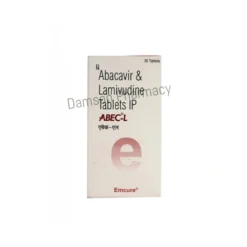ABEC L Abacavir & Lamivudine Tablets
$150.00 – $432.00Price range: $150.00 through $432.00
| Pack Size | Price | Price / Unit | Quantity | |
|---|---|---|---|---|
| 30 Tablets | $150.00 | $5.00/ unit | ||
| 60 Tablets | $294.00 | $4.90/ unit | ||
| 90 Tablets | $432.00 | $4.80/ unit |
Looking for bulk / B2B pricing? | Send Inquiry |

| SKU | 11519 |
| Manufacturer | Emcure Pharmaceuticals Ltd |
| Categories | Anti HIV |
| Delivery Time | 10 - 14 Working Days |
| Strength | 600mg + 300mg |
Introduction to ABEC L Abacavir & Lamivudine Tablets
ABEC L is a combination medication containing Abacavir and Lamivudine, two potent antiretroviral agents used in the treatment of HIV-1 infection. These medications work together to inhibit the reverse transcriptase enzyme, a critical component of the HIV replication process, thereby reducing the viral load in the body. By suppressing HIV replication, It helps improve immune function and delays the progression of the disease.
This medication is typically prescribed as part of Antiretroviral Therapy (ART), in combination with other drugs, to achieve optimal control over the virus. It is known for its convenient once-daily dosing, improving adherence to treatment regimens, which is crucial for maintaining viral suppression and preventing resistance. Regular use under medical supervision helps patients achieve undetectable viral loads, reducing the risk of transmission and enhancing quality of life.
Patients using It must undergo screening for hypersensitivity to Abacavir, as it can lead to severe, potentially life-threatening allergic reactions. Additionally, healthcare providers monitor liver function and kidney health, as Lamivudine may impact these organs. Proper adherence to prescribed dosing and routine medical follow-ups are essential for ensuring the safety and efficacy of ABEC L in managing HIV infection.
Uses of ABEC L Tablets
ABEC L, which contains Abacavir and Lamivudine, is primarily used in the treatment of HIV (Human Immunodeficiency Virus) infection. These medications belong to a class of drugs known as nucleoside reverse transcriptase inhibitors (NRTIs). Here are the main uses of ABEC L Tablet:
- HIV Treatment
- Prevention of Mother-to-Child Transmission (PMTCT)
- Post-Exposure Prophylaxis (PEP)
How Does ABEC L Tablets Works?
ABEC L tablets combine Abacavir and Lamivudine, two nucleoside reverse transcriptase inhibitors (NRTIs) that work together to inhibit the replication of the HIV virus. These drugs target the reverse transcriptase enzyme, which HIV uses to convert its RNA into DNA, a critical step in the viral replication cycle. By interfering with this process, It prevents the virus from multiplying and reduces the viral load in the body.
This reduction in viral replication allows the immune system to recover and function more effectively, slowing the progression of HIV-related complications. When used as part of antiretroviral therapy (ART), It enhances treatment efficacy, helping to achieve and maintain undetectable viral levels, which is crucial for improving the quality of life and minimizing the risk of transmission.
Side Effects of ABEC L
Common Side Effects
- Headache
- Nausea and vomiting
- Diarrhea
- Fatigue and tiredness
- Dizziness
- Insomnia (trouble sleeping)
- Loss of appetite
- Mild rash
Serious Side Effects
- Hypersensitivity Reaction to Abacavir
- Lactic Acidosis
- Pancreatitis (Inflammation of the Pancreas)
- Liver Problems
- Changes in Immune System Function
Dosage of ABEC L Abacavir & Lamivudine
The dosage of ABEC L, which contains Abacavir and Lamivudine, can vary depending on the specific formulation and the patient’s individual medical condition. It’s crucial for individuals to follow their healthcare provider’s instructions and the prescribed dosage on the medication label. Dosages are typically determined based on factors such as the patient’s weight, renal function, and other health considerations.
Here are general guidelines for the recommended dosage of ABEC L:
- Standard Dosage for Adults and Adolescents Weighing at Least 40 kg
- Pediatric Dosage
- Special Populations
How To Manage Side Effects?
Managing side effects of ABEC L (Abacavir and Lamivudine) or any antiretroviral medication is an essential aspect of HIV treatment. It’s important for individuals to communicate openly with their healthcare provider about any side effects experienced. Here are general strategies for managing common side effects:
- Regular Monitoring
- Communication with Healthcare Provider
- Follow Prescribed Dosage
- Seek Immediate Medical Attention
- Emergency Identification Card
Warning & Precautions
ABEC L, containing Abacavir and Lamivudine, comes with specific warnings and precautions that individuals should be aware of. It’s important for patients to discuss their medical history and any existing conditions with their healthcare provider before starting this medication. Here are some important warnings and precautions associated with ABEC L:
1. Hypersensitivity Reaction to Abacavir:
- A small percentage of individuals may experience a severe and potentially life-threatening hypersensitivity reaction to Abacavir.
- Before starting ABEC L, individuals should undergo HLA-B*5701 screening to identify those at higher risk of hypersensitivity.
- If symptoms such as fever, rash, nausea, vomiting, abdominal pain, fatigue, or difficulty breathing occur, individuals should seek immediate medical attention, as this may indicate a hypersensitivity reaction.
2. Lactic Acidosis:
- Lactic acidosis, a rare but serious side effect, has been reported with some nucleoside reverse transcriptase inhibitors (NRTIs), including Lamivudine.
- Symptoms may include deep and rapid breathing, weakness, abdominal pain, and unexplained weight loss.
- This condition requires immediate medical attention.
3. Liver Problems:
- Both Abacavir and Lamivudine can cause liver enzyme elevations.
- Individuals should be monitored for signs of liver problems, such as yellowing of the skin or eyes (jaundice) and dark urine.
- Severe liver problems are rare but can occur.
4. Pancreatitis:
- Although rare, Lamivudine has been associated with inflammation of the pancreas (pancreatitis).
- Symptoms may include severe abdominal pain that may radiate to the back.
- Immediate medical attention is necessary if symptoms of pancreatitis occur.
5. Immune Reconstitution Inflammatory Syndrome (IRIS):
- Individuals starting antiretroviral therapy, including ABEC L, may experience IRIS, which involves an exaggerated inflammatory response to pre-existing infections.
- Patients should seek medical attention if they experience new or worsening symptoms after starting ABEC L.
6. Renal Impairment:
- Dosage adjustments may be necessary for individuals with impaired renal function. The healthcare provider will determine the appropriate dosage based on the patient’s kidney function.
7. Pregnancy and Breastfeeding:
- The use of ABEC L during pregnancy should be carefully considered, and the potential risks and benefits should be discussed with the healthcare provider.
- Breastfeeding should be avoided in individuals with HIV due to the risk of transmission. The healthcare provider will provide guidance on the best approach for each individual.
Safety Advice
The safety of ABEC L (containing Abacavir and Lamivudine) is crucial for individuals living with HIV. To ensure safe and effective use, individuals should follow the safety advice provided by their healthcare providers. Here are important safety considerations and advice associated with ABEC L:
- Regular Monitoring
- Liver Function Monitoring
- Pancreatitis
- Pregnancy and Breastfeeding
- Renal Impairment
- Regular Follow-Up Appointments
Frequently Asked Questions
1. Is ABEC L safe during Pregnancy?
Ans. The use of ABEC L during pregnancy should be carefully considered, and the potential risks and benefits should be discussed with a healthcare provider.
2. Can I breastfeed while taking ABEC L?
Ans. Breastfeeding is generally not recommended for individuals with HIV due to the risk of transmission. The healthcare provider will provide guidance on the best approach for each individual.
3. How often should I see my healthcare provider while taking ABEC L?
Ans. Regular follow-up appointments are essential to monitor overall health, assess treatment effectiveness, and manage any potential side effects or complications.
4. Can ABEC L interact with other Medications?
Ans. Inform your healthcare provider about all medications, including over-the-counter drugs and supplements, to identify potential drug interactions.
| Pack Size | 30 Tablets, 60 Tablets, 90 Tablets |
|---|---|
| Price/Unit | $4.80/unit, $4.90/unit, $5.00/unit |
1 review for ABEC L Abacavir & Lamivudine Tablets
Add a review Cancel reply
Related Products
No related Products Found









Lyotchik Liton –
I started taking ABEC-L Tablets almost 2 years ago when I found out I had HIV. And my blood count has been going up, and I have been feeling GREAT!